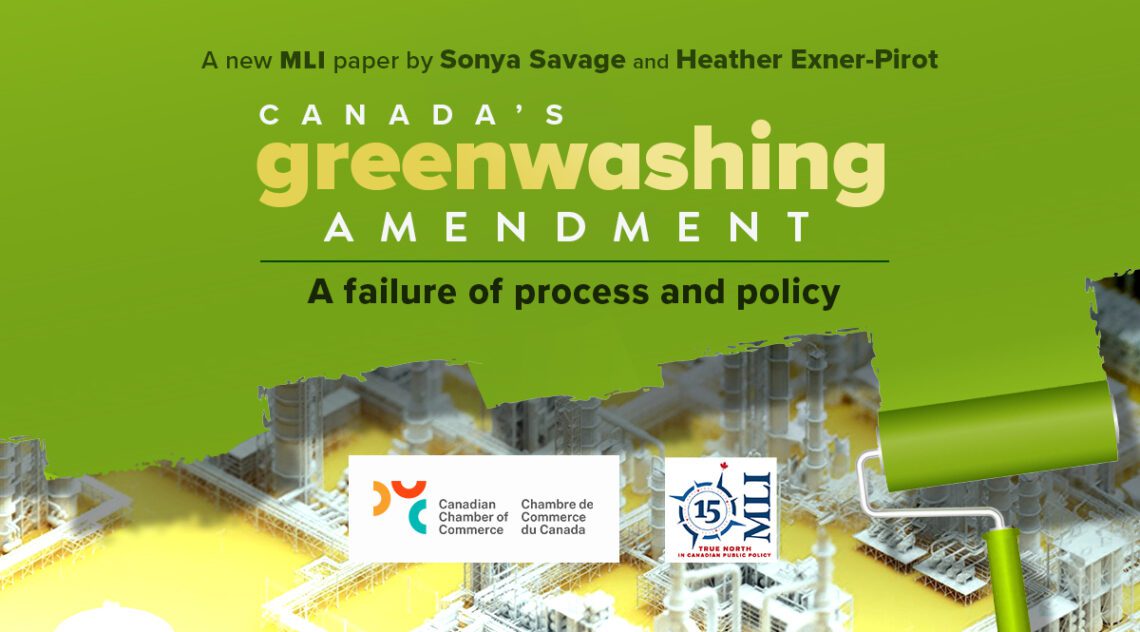By Sonya Savage and Heather Exner-Pirot
February 26, 2025
Executive Summary
On April 30, 2024, the House of Commons Standing Committee on Finance pushed through a late-stage amendment to the Competition Act under Bill C-59: The 2023 Fall Economic Statement. The “greenwashing amendment,” as it has come to be known, has had a dramatic silencing effect on the many businesses and associations across the country that want to communicate their environmental goals. The amendment has provided consumers with no concomitant benefits and should be repealed in its entirety.
In combination with other changes to the Competition Act, the greenwashing amendment – implemented under the pretence of combatting deceptive marketing practices and protecting the public from corporations that seek to mislead citizens about their “green” bona fides – imposes a host of ill-conceived provisions, including:
• Demanding that people or companies that make environmental claims prove their assertions based on an “internationally recognized methodology.” The amendment does not define that methodology – and for some products it may not even exist.
• Applying a reverse onus of proof, which could expose companies and those subject to the Competition Act to large costs even from frivolous or mischievous complaints.
• Enabling “rights of private action,” which allow environmental activists and climate advocacy groups, as well as consumers, business competitors, or even disgruntled employees, to file complaints. Previously, only businesses whose operations were directly affected by another’s alleged anti-competitive conduct could bring a private action.
• Applying punitive fines, up to $10 million for a first offence or 3 per cent of the corporation’s annual worldwide gross revenues, whichever is greater. For a large oilsands company – the obvious target of the amendment – that could mean fines of over a billion dollars.
Further, the amendment applies not just to consumer products, but to business activities, which takes it far outside the mandate of Competition Bureau Canada. It encompasses representations made to investors, regulators, financial institutions, shareholders, and even governments. There are implications for organizations that don’t even offer products or services to consumers.
The amendment passed with virtually no debate, no opportunity for consultation with stakeholders, and no fulsome discussion in the ordinary course of parliamentary procedure. It had immediate and negative repercussions on Canadian businesses and industry associations across dozens of sectors.
This paper describes how the amendment came about – and its subsequent fallout. It explains how such a consequential and controversial legislative change could be made without due process or input from Canadians.
It identifies the most damaging features of the greenwashing amendment and documents the many criticisms of the amendment that followed. Those criticisms come not only from oil and gas companies and industry associations, but from across the political and business spectrum including from the Alberta NDP, Green Party leader Elizabeth May, Environment and Climate Change Canada officials, and many other groups that favour high environmental standards but not the greenwashing clause.
The paper outlines Canada’s approach to greenwashing claims, including the many processes and standards that run parallel to or even contradict the greenwashing amendment. It compares Canada’s approach with that of its peers in the United Kingdom, United States, European Union and Australia.
There may be ways for Canada to mitigate the uncertainty, risk, greenhushing, and other negative impacts wrought by the amendment introduced in Bill C-59. However, this paper does not propose such fixes. The amendment is so flawed, and its inclusion in competition law so aberrant, that the authors’ recommendation is that it be repealed.
Read the full paper here:







